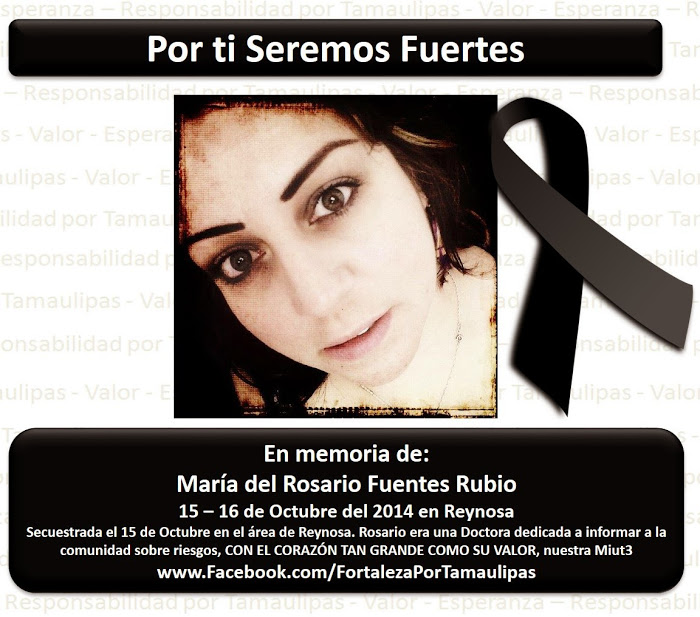
Image from Valor por Tamaulipas’ Google Plus account. “For you we will be strong. In memory of: María del Rosario Fuentes Rubio, 15-16 October 2014 in Reynosa. Kidnapped on 15 October in the Reynosa area. Rosario was a doctor dedicated to informing the community about dangers, with a heart as big as her courage, our Miut3.”
Citizen groups in the northern Mexican state of Tamaulipas reported yesterday that Twitter user María del Rosario Fuentes Rubio had been kidnapped and murdered. Although it is unknown who was responsible for her death, photographs of Fuentes Rubio's body appeared on her Twitter stream.
Her Twitter account @Miut3 was suspended shortly thereafter. After María del Rosario supposedly asked for forgiveness for facing the drug lords, photos of her own murder were published, as well as a posthumous message that warned other citizen journalists to remain quiet about Reyonsa's violence because “you won’t get anything out of it.”
A Reynosa medical doctor, Fuentes Rubio volunteered as a contributor with Valor por Tamaulipas (Courage for Tamaulipas), a citizen media platform that allows users to file anonymous reports on violence, particularly incidents concerning organized crime and the drug trade. She also served as an administrator for Responsabilidad por Tamaulipas (Responsibility for Tamaulipas), a similar project associated with the first. The last post by “Valor for Tamaulipas” described her as “an angel who gave everything, her life, her future, her safety and peace (…) for the good of the people of the state.”
This is not the first time individuals associated with these networks have been punished for their reporting. Since it was established in 2012, Valor por Tamaulipas has faced a range of threats and incidents of violence that at times have forced administrators to pause their activities.
Valor por Tamaulipas has been using social media to crowdsource reports from citizens in the state of Tamaulipas, which has been riddled with drug-related conflict and corruption since 2006. In February of 2013, an unidentified drug organization circulated a pamphlet offering MX$600,000 (about US$44,000) for information on the whereabouts of the administrator(s) of the Valor por Tamaulipas social media accounts. Shortly afterwards, @ValorTamaulipas announced plans to suspend reporting. But the network has since taken shape once more — violent crime continues to plague Tamaulipas and citizens continue to report on it.
This conflict has forced many traditional news organizations to curb their reporting on drug violence; the Committee to Protect Journalists estimates that sixteen journalists have been killed in Mexico since 2006, mostly due to their coverage of drug-related crime and corruption. As Darío Ramírez, general director of Article 19 in Mexico and Central America, said: “The violence against the press in Tamaulipas and the lack of protection for freedom of expression by the Mexican authorities has generated information vacuums in issues related to public security, for which social media has become an effective citizen tool to be freely informed about this acts.”
As citizen and social media users work to fill this silence and report on what they see and hear on the ground, groups like VxT and individuals like Fuentes Rubio have become prime targets for drug organizations.



